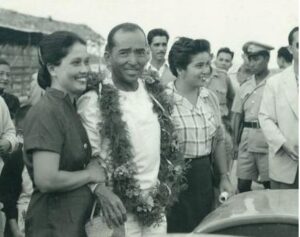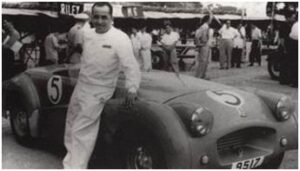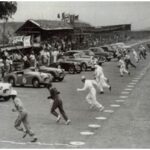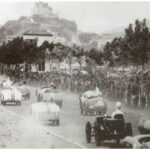Macau Grand Prix
Originally published in the Macau Closer Magazine Nov 2012
(Original article by Suzanne Watkinson was updated in September 2013 by Nana giving more details.)
Photos courtesy of Macau Grand Prix Museum
This being the Diamond Jubilee of the Macau Grand Prix, I think it is appropriate to reflect on the first Grand Prix held on the 30th and 31st of October, 1954 as a club race for local motoring enthusiasts which has now evolved into the finest street circuit race in the world.
Well known local Macanese motor enthusiast of the day and skilled car mechanic, Eddie Carvalho was one of 15 entrants to compete in a four-hour race over 51 laps of the 3.9 mile Guia circuit, and with his Triumph TR2 he took victor’s laurels in this inaugural event.

Sixty years later, fond memories remain of the man who helped put street circuit racing – and Macau – on the world map.
Now in her senior years and enjoying life living in Hong Kong and Sydney, Maria Fernanda (Nana) Cabral de Carvalho Barros is Eddie Carvalho‘s second child. Born in Lisbon, Nana and her elder sister Nina grew up in Hong Kong – and in Macau during WWII years. She still has vivid memories of that time and of her beloved father.
“Our father gave us a lot of freedom to explore the myriad of little streets on our bicycles, to go fishing in the reservoir with our homemade bamboo rods, and to play with the other children and fly kites in the Vasco de Gama park opposite the house where we lived in Calcada do Gaio”, remembers Nana.
Eddie was born and raised in Hong Kong, coming from a line of well-respected financiers of the day. His father had been Chief Clerk of the Hong Kong and Shanghai Bank, the most senior position of the ‘local’ staff, and he owned a sizeable property on May Road/Tregunter Path – known as Vila Verde. (I believe it is today known as the Vila Verde Towers) His grandfather was Chief Cashier for the Hong Kong Treasury.
Eddie’s father had firm ideas that his son and heir would follow in his footsteps and continue the family tradition of working in finance. He sent Eddie to London to learn to be an Accountant.
But the young man’s heart lay elsewhere. Uninterested in his studies he pursued his passion for music and sports. By the time Eddie was 16, both his parents had passed away and having inherited the family fortune, he abandoned school and moved to Portugal where he lived a playboy life of horse riding, music, and fast cars.
Clearly a man of talent, action and enthusiasm, he threw his energies into a wide range of interests. He was an accomplished musician, playing trumpet in a weekend band; and he was also an excellent horseman and was selected as 1st Reserve for the Portuguese Equestrian Team for the 1928 Olympics.
It was in Europe that he got bitten by the car rally driving bug. A totally self-taught and skilled motor mechanic, when he returned to Hong Kong he joined Gilman’s, one of the major companies (Hongs) in Hong Kong, becoming service manager for their motor services division, then general manager for Far East Motors. A few years later he opened the United Far East Motors. During that period he also became a member of the Motor Sports Club.
For clients with expensive beautiful classic cars that needed specialist repairs – among them numerous Cathay pilots with their ‘souped up’ cars – Eddie was ‘The Man’. (Suzanne Watkinson who is the author of the original article goes on to say: her father a British army officer, Brian Watkinson, had a much-loved Morgan – and he and Eddie became firm friends as Eddie helped keep the temperamental machine road worthy) A wonderful coincidence when they met, now Nana and Suzanne are good friends.
In Hong Kong, Eddie’s talent for riding enabled him to be an amateur jockey, riding for friends such as Marcus de Silva, owner of ‘Crown Witness’ and ‘Hostile Witness’. (Marcus da Silva was the father of Archie de Silva – the owner of the world-famous racehorse in Hong Kong ‘Silent Witness’). Dad also rode for good friend Jackie Noronha on “Can Do”, and it was fondly referred to as “no can do’, because it never won a race!
For the first few years of WWII, Eddie and his family stayed on in Hong Kong, and true to his adventurous spirit, he became involved in espionage.
Dad had a shoe-making business in the roof-top floor of the house where we lived (at the home in Ho Man Tin Street of the Soares family – Uncle Chicito, Auntie Angela, and sons Ronnie and Billie); but this business was a cover for sending messages between Hong Kong and Macau” Nana says.
Little notes passed between the two territories in the soles of patron’s shoes. When the Japanese got wind of this, the whole family took flight by sampan to Macau one night. Nana still speaks of this experience with wide-eyed excitement mixed with terror. Dad allowed Nina and me each to take one favourite toy with us on this mysterious trip. It took many, many hours of rowing by the sampan fisherman and his wife before we arrived safely in Macau. During the whole journey it was imperative to be quiet, as the sound of talking may have carried and heard by the Japanese patrol boats patrolling the waters between Hong Kong and Macau.

Nana also recalls the time in Macau when “we heard the airplanes approaching in the distance, and then the screaming sound of the American planes dive bombing to destroy the fuel drums stored inside the Macau seaplane hangar – this was done to prevent the fuel from getting into the wrong hands during those WWII years.
No doubt a challenging time for Eddie and his wife, the war years spent in Macau were however the happiest time for Nana and her sister. Macau was neutral, and unlike Hong Kong where the Japanese occupation was oppressive, life in Macau was comparatively care-free. The two sisters – Nina and Nana – were allowed freedom to go off to play on condition they were always together. Those were strict orders from Dad, but now I can understand those orders were given for our own safety.
Nonetheless, Nana remembers her father as being very strict but also fair. He came from the school of ‘eat what is put in front of you’.
Quick-tempered and intolerant of silliness, Eddie did not suffer fools. But he had a special magic that drew young people approaching adulthood to him for guidance and advice. Through coaching a local softball team, Eddie became a mentor to many.

And what does Nana remember of the big day when her father won the first Macau Grand Prix? This of course was back in the days when the lovely Praia Grande seawall stretched for miles along the waterfront passing the Tennis Civil, Park Infantil, and the old Governor’s Office; and curving gently around in front of the old Lisboa hotel and ending at the Amaral Statue – which has now been demolished.

The Grand Prix starting grid was located where it is today by the reservoir, but the Grand Stands and other structures were constructed of bamboo scaffolding with thatched roofing. And as for food and refreshments – that left much to be desired. “It was all rather primitive compared to the luxuries of today’s Grand Stands and VIP Lounges. There were no food or drinks stalls, so we had to bring our own food water/drinks and sandwiches!” says Nana. But no one complained as it was a happy and exciting atmosphere.
The races were in smaller groups of about 10-20 cars – and there was even a ladies race with soft-top convertibles. “Sadly Dad wouldn’t let me compete in the Ladies’ Race but he was delighted when a Portuguese lady, our friend Maria Fernanda Ribeiro won the first Ladies’ Race.”.
Eventually Eddie left Asia to work as a service manager of a big garage in Sydney. He retired and in his mid-70s had a stroke. He died a happy man content in his achievements and having always lived life to the full.
Nana married her childhood friend and fellow Portuguese Henry “Quito” Barros in Hong Kong in 1963, and they will be celebrating their 50th Anniversary later this year (2013). Splitting their time between Hong Kong and Sydney, they have one son, Rick and are proud grandparents to 2-year old Charlie.
Grande Prémio de Macau
Publicado originalmente na revista Macau Closer, nov. 2012
(Artigo original de Suzanne Watkinson, atualizado em setembro de 2013 por Nana, com mais detalhes.)
Fotografias cortesia do Museu do Grande Prémio de Macau
Sendo este o Jubileu de Diamante do Grande Prémio de Macau, é apropriado recordar o primeiro Grande Prémio, realizado a 30 e 31 de outubro de 1954, então uma prova de clube para entusiastas locais, que evoluiu para o melhor circuito citadino do mundo.
O conhecido macaense entusiasta do automobilismo e hábil mecânico Eddie Carvalho foi um dos 15 participantes numa corrida de quatro horas, com 51 voltas ao circuito da Guia (3,9 milhas). Com o seu Triumph TR2, conquistou a vitória nesse evento inaugural.

Sessenta anos depois, perduram as memórias do homem que ajudou a colocar as corridas de rua — e Macau — no mapa mundial.
Hoje, já na terceira idade e a viver entre Hong Kong e Sydney, Maria Fernanda (Nana) Cabral de Carvalho Barros é a segunda filha de Eddie Carvalho. Nascida em Lisboa, Nana e a irmã mais velha, Nina, cresceram em Hong Kong — e em Macau durante os anos da Segunda Guerra Mundial. Conserva memórias vívidas desse tempo e do seu querido pai.
“O nosso pai deu‑nos muita liberdade para explorar as miríades de ruelas de bicicleta, pescar no reservatório com canas de bambu feitas em casa e brincar com as outras crianças e empinar papagaios no Parque Vasco da Gama, em frente da casa onde vivíamos, na Calçada do Gaio”, lembra Nana.
Eddie nasceu e foi criado em Hong Kong, descendente de uma família de reconhecidos financeiros. O pai foi Chief Clerk do Hong Kong and Shanghai Bank, o posto mais alto do pessoal “local”, e possuía uma vasta propriedade em May Road/Tregunter Path — a Vila Verde (hoje Vila Verde Towers). O avô foi Chief Cashier do Tesouro de Hong Kong.
O pai tinha a firme intenção de que o filho seguisse as suas pisadas nas finanças. Enviou Eddie para Londres para se formar em Contabilidade.
Mas o coração do jovem estava noutro sítio. Pouco interessado nos estudos, perseguiu a paixão pela música e pelo desporto. Aos 16 anos, já órfão e herdeiro da fortuna da família, abandonou a escola e mudou‑se para Portugal, onde levou uma vida de playboy feita de equitação, música e carros rápidos.
Homem talentoso, de ação e entusiasmo, investiu em múltiplos interesses: era músico — tocava trompete numa banda de fim de semana —, excelente cavaleiro e foi 1.º Reserva da equipa equestre portuguesa nos Jogos Olímpicos de 1928.
Na Europa, ganhou o “bichinho” dos ralis. Autodidata e hábil mecânico, ao regressar a Hong Kong juntou‑se à Gilman’s, uma das grandes casas, tornando‑se chefe de serviço na divisão automóvel e depois diretor‑geral da Far East Motors. Alguns anos depois abriu a United Far East Motors e filiou‑se no Motor Sports Club.
Para clientes com clássicos valiosos que exigiam reparações de especialista — entre eles muitos pilotos da Cathay com carros “souped up” —, Eddie era “o Homem”. (Suzanne Watkinson, autora do artigo original, conta que o pai, o oficial do exército britânico Brian Watkinson, tinha um adorado Morgan — e ele e Eddie tornaram‑se grandes amigos enquanto Eddie mantinha a temperamental máquina em condições.) Coincidência feliz: quando se conheceram, Nana e Suzanne tornaram‑se boas amigas.
Em Hong Kong, o talento equestre de Eddie permitiu‑lhe ser jóquei amador, correndo para amigos como Marcus de Silva, dono de “Crown Witness” e “Hostile Witness”. (Marcus da Silva era pai de Archie de Silva, proprietário do famoso cavalo “Silent Witness”.) Também montou para o amigo Jackie Noronha no “Can Do”, carinhosamente apelidado “no can do” por nunca ganhar!
Nos primeiros anos da II Guerra Mundial, Eddie e a família permaneceram em Hong Kong e, fiel ao espírito aventureiro, envolveu‑se em espionagem.
O pai tinha um pequeno negócio de fabrico de sapatos no telhado da casa onde vivíamos (na rua Ho Man Tin, na casa da família Soares — tio Chicito, tia Angela e os filhos Ronnie e Billie); esse negócio servia de cobertura para enviar mensagens entre Hong Kong e Macau”, diz Nana.
Bilhetinhos passavam entre os dois territórios nas solas dos sapatos dos clientes. Quando os japoneses se aperceberam, toda a família fugiu de sampana para Macau numa noite. Nana fala dessa experiência com um misto de entusiasmo e terror. O pai permitiu que Nina e eu levássemos um brinquedo favorito nessa viagem misteriosa. Foram muitas horas de remo do pescador e da sua mulher até chegarmos a salvo a Macau. Durante todo o trajeto era imperativo manter silêncio, pois as vozes podiam ser ouvidas pelos botes de patrulha japoneses entre Hong Kong e Macau.

Nana lembra também quando “ouvimos os aviões aproximarem‑se ao longe, e depois o grito dos aviões americanos em mergulho a destruir os tambores de combustível guardados no hangar de hidroaviões de Macau — para impedir que o combustível caísse em mãos erradas durante aqueles anos de guerra”.
Sem dúvida um tempo difícil para Eddie e a esposa, mas os anos de guerra em Macau foram os mais felizes para Nana e a irmã. Macau era neutra e, ao contrário de Hong Kong, onde a ocupação japonesa era opressiva, a vida era comparativamente despreocupada. As duas irmãs — Nina e Nana — tinham liberdade para sair, com a condição de estarem sempre juntas. Eram ordens rígidas do pai, que hoje se entendem como proteção.
Ainda assim, Nana lembra o pai como muito exigente mas justo. Era da escola do “come o que está à frente”.
De temperamento vivo e intolerante com tolices, Eddie não aturava tolos; mas tinha um encanto especial que atraía jovens à procura de conselho. Ao treinar uma equipa local de softball, tornou‑se mentor de muitos.

E o que recorda Nana do grande dia em que o pai venceu o primeiro Grande Prémio de Macau? Naqueles tempos, o belo paredão da Praia Grande estendia‑se ao longo da marginal, passando pelo Ténis Civil, Parque Infantil e antigo Palácio do Governo; curvava em frente ao antigo Hotel Lisboa e terminava na Estátua de Amaral — hoje demolida.

A grelha de partida ficava, como hoje, junto ao reservatório, mas as bancadas e outras estruturas eram de andaime de bambu com cobertura de colmo. Quanto a comidas e bebidas, pouco havia: “Era tudo bastante primitivo comparado com os luxos das bancadas e salas VIP atuais. Não havia bancas; levávamos água e sandes!”, diz Nana. Ainda assim, ninguém se queixava: o ambiente era alegre e emocionante.
As corridas decorriam em grupos mais pequenos, cerca de 10–20 carros — e havia prova feminina com descapotáveis. “Infelizmente o pai não me deixou competir, mas ficou radiante quando a nossa amiga Maria Fernanda Ribeiro venceu a primeira corrida feminina.”
Mais tarde, Eddie deixou a Ásia para trabalhar como chefe de serviços numa grande oficina em Sydney. Reformou‑se e, já nos 70, sofreu um AVC. Morreu feliz, satisfeito com as suas conquistas e por ter Vivido plenamente.
Nana casou com o amigo de infância e também português Henry “Quito” Barros em Hong Kong, em 1963; em 2013, celebrariam as bodas de ouro. Entre Hong Kong e Sydney, têm um filho, Rick, e são avós do pequeno Charlie.
